| Parameter | Django | Laravel |
|---|---|---|
| Developed By | Adrian Holovaty, Simon Willison | Taylor Otwell |
| Speed | Fast | Comparatively Slow |
| Language | Python | PHP |
| Architecture Used | MVT | MVC |
| APIs Support | Doesn’t have inbuilt API support and requires additional libraries to build APIs | Has built-in API support. Additional libraries are not included to create Rest APIs. | Learning Curve | Easy | Relatively Complex |
| Routing | Difficult | Simple |
| Time Needed for Development | Less Time Needed | Comparatively More Time Needed |
| License | 3-Clause BSD | MIT |
| Scalability | Django inherits Scalability from Python, which is highly scalable and works well with AI, and ML-based applications. | Laravel also has good scaling capabilities inherited from PHP that support horizontal scaling but is less flexible than Python in responding to growing demands. |
| Microservices compatibility | Highly compatible with microservices and enables rapid deployment, versatility, and built-in security. | Due to PHP, Laravel also provides support for microservices, but you have to use Lumen, a lighter version of Laravel. |
| Database support | Has MySQL, Oracle, MariaDB, PostgreSQL, and SQLite database support | Has MySQL, PostgreSQL, SQL, and SQLite database support | Community | The extensive Community has 103k+ members on Reddit and 66.9k+ stars with 28k+ forks on GitHub. | Huge Community with 70k+ artisans on Reddit and 71.2k+ stars with 23k+ forks on GitHub. |
Quick Summary:
Every business owner wishes for an app that suits the market trends and is scalable in the future, among other factors. In this blog post, we have covered everything you need to know about Django vs Laravel for backend development, including Performance, Popularity, Scalability, Microservices Compatibility, and others. We have also mentioned where and when using them would be beneficial for your application development.
Table of Contents
Django vs Laravel: Overview
The struggles associated with choosing the proper framework for backend development are a never-ending hustle. Though several backend development frameworks are available for your disposal, the two most acclaimed ones are Django and Laravel. Before moving forward with the detailed comparison between the two, let us look at the circumferential overview of Django vs Laravel.
What is Django?
The backend Django is precisely an open-source high-level framework written in Python. It is licensed by a 3-clause BSD (Berkeley Software Distribution) license and follows an MVT architecture that promotes fast development, efficient and cleaner code with pragmatic design. Django also has a built-in database support SQLite.
Features of Django
The primary objective of Django is to ease the development of complex web applications in lesser time. And similar to Laravel, Django also has numerous features that help achieve this intent. Let’s have a look at a few features of Django:
- Free and Open Source
- Optimized
- Scalable
- Flexible & Versatile
- Security
- Community
- Fully Featured
What is Laravel?
Laravel is an open-source PHP-based web framework renowned for server-side processing, HTML authentication, templating, and others. It follows an MVC architecture. As a server-side framework, Laravel allows you to build pre-defined architectures, modifiable backend logic, full-stack apps, and web projects (such as routing sessions, caching, and others.) You can also manage SaaS products within Laravel.
Laravel implicates several features that involve the essential elements of the PHP frameworks, such as CodeIgniter, Yii, and various other languages like Ruby on Rails. It also possesses a set of features that reduce development time.
Product owners who are comfortable with Core PHP and Advanced PHP can work efficiently with Laravel and save time which otherwise would be required to be invested in building a website from scratch. Also, the web apps build in Laravel have robust security.
Features of Laravel Framework
Laravel possesses a wide assortment of features that help product owners to create exceptional apps with unique functionalities too easily. Let’s have a look at a few of them:
- Libraries and Modular
- Template Engine
- Artisan
- Reverse Routing
- MVC Architecture Support
- Database Seeding
- Localization Validation
- File System
- Application Logic
Given above are the Features of Laravel. You can have detailed information about these features per your project’s requirements.
So, this is the basic overview of both the frameworks and the extensive features they offer business owners. Now, let’s take a quick view of the Laravel vs Django Comparison Table before we dive deep into the thorough details of it.
Django vs Laravel Comparison Table
Laravel is a framework with expressive and elegant syntax, whereas Django is a framework that promotes fast development and clean and pragmatic design. Considering these factors, we have consolidated a tabular presentation of the difference between Django vs Laravel 2022-23 below.
Django and Laravel are both powerful backend frameworks for complex web app development. Your choice should be based on app scalability, easy development and maintenance. If you are still not able to make the right decision.
Book a 30 min call with us to make a confident decision
It was the tabular presentation of the comparison between the two frameworks. Now, let us jump onto the in-depth comparison of Laravel vs Django.
Django vs Laravel: In-Depth Comparison
These two frameworks have a few out-of-the-box attributes that make them unique and preferred by the product owners. But, to know in detail which of the two should be your ideal pic, an in-depth comparison is the best solution. So, without any delay, let’s move forward with it.
Django vs Laravel: Which one is more popular in 2022-23
Laravel and Django have made a mark in the market and have seen substantial growth. According to Github, Laravel possesses 71.2k Stars and 23k Forks, while Django possesses 66.9k Stars and 28k Forks.
According to Google Trends, both frameworks have shown a considerable upsurge in terms of the preferences of the product owners.
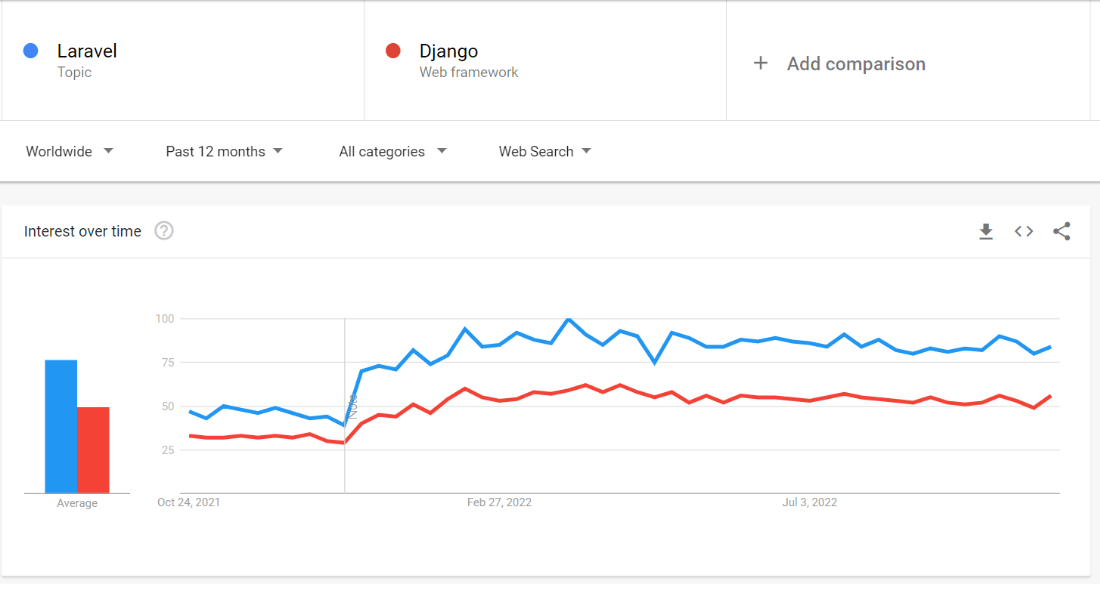
Referring to a comparison on SimilarTech, both frameworks are almost equally popular, with Laravel being used by around 133,542 websites, of which 95,502 are on unique domains. In contrast, Django is used by 81,482 websites, of which 49,948 are on unique domains.
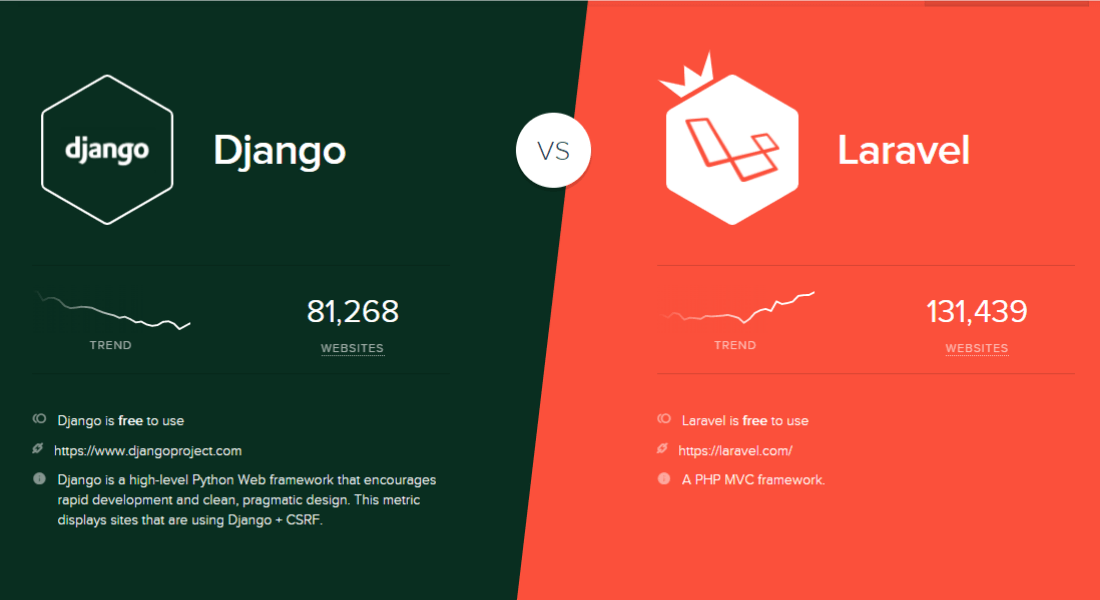
Diving deeper into the comparison metric of Laravel vs Django Popularity, we can see that Laravel seems more preferred in Computer Electronics & Technology, Arts & Entertainment, Law & Government, Finance, and Business & Consumer Services. At the same time, Django is preferred in Science & Education and Hobbies & Leisure.
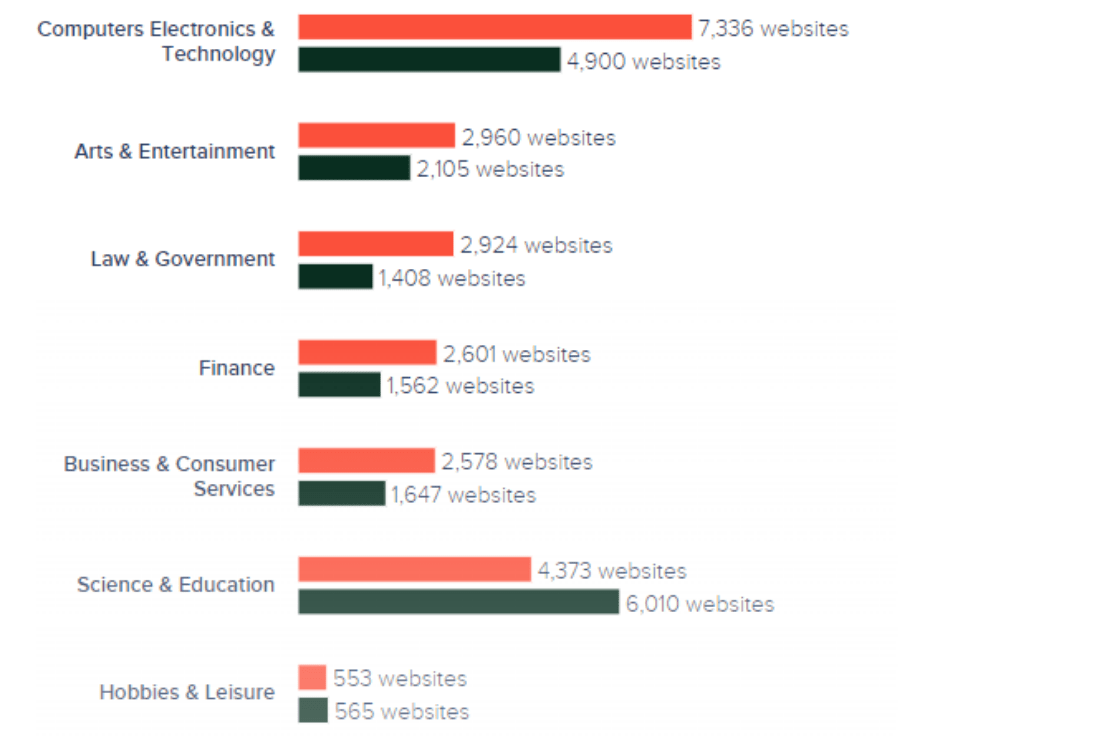
Talking about Django vs Laravel Market Share, Django again lags behind Laravel as per SimilarTech.
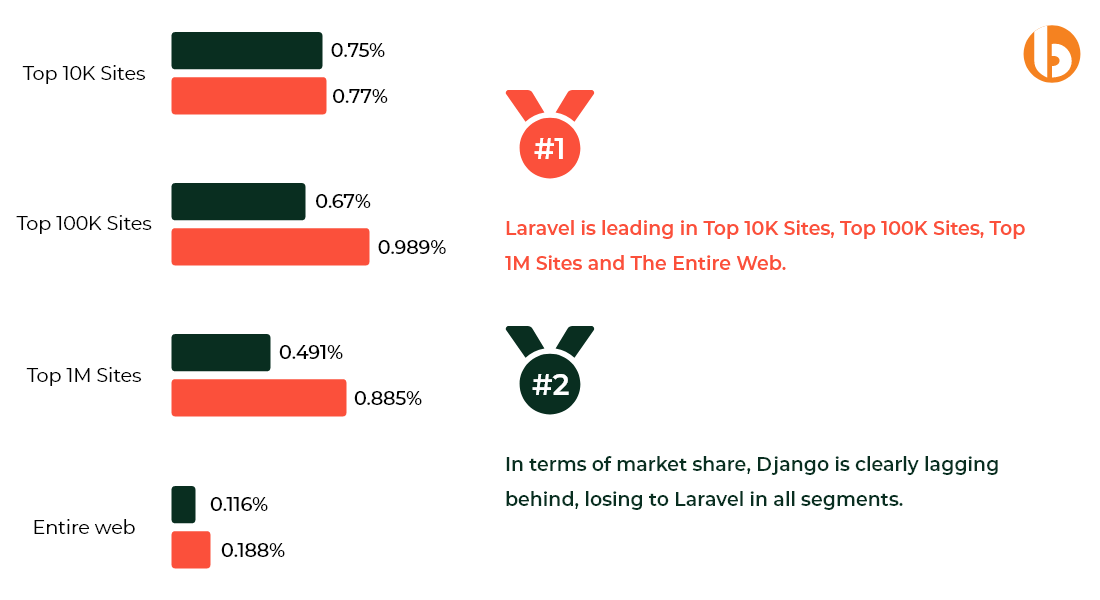
However, considering StackOverflow Survey 2022, Laravel is preferred by only 9.45% of developers, while Django is preferred by 14.65% of developers.
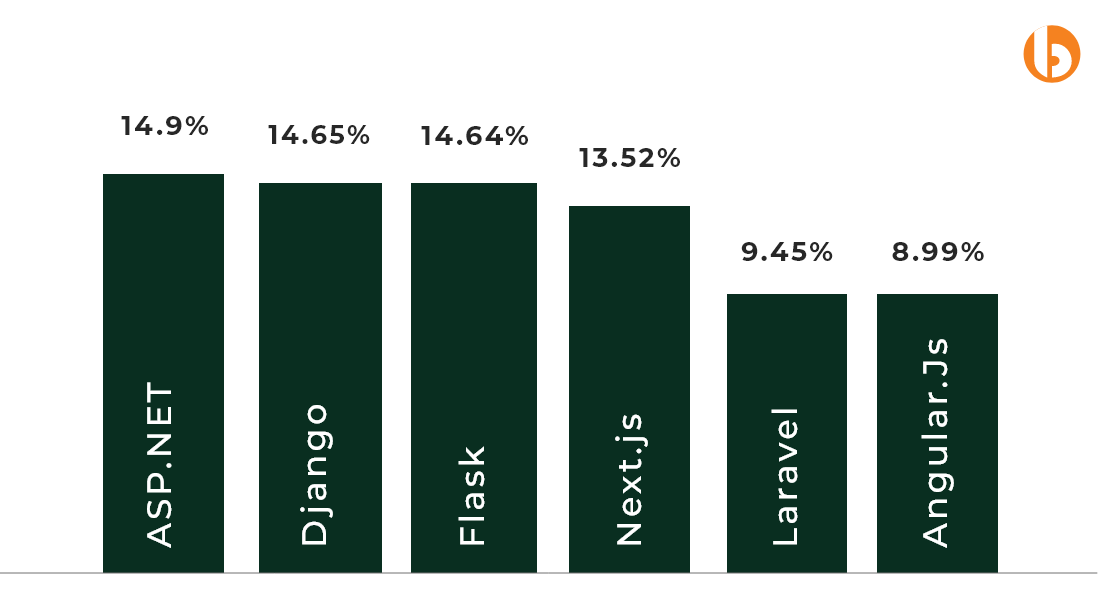
So, we can infer that though Django started its popularity race quite late, Laravel still has observed a massive upsurge in popularity and preference. But we can expect both frameworks to reach great heights in terms of Popularity and Market Share, and at some point, Django might overthrow Laravel in the segment, but, at present, Laravel wins this segment.
Django vs Laravel Performance Comparison
Performance is an essential component of any web application. Nobody likes a web app that lags or takes too much of the User’s time. Considering the same under Django vs Laravel performance benchmark, factors like hardware resources, storage space, and memory., affect your application’s performance. And choosing the wrong framework can negatively impact your app’s performance and reduce your market credibility.
Does Django have better Performance than Laravel?
Django is an excellent choice in terms of performance as it uses Python, which is already a presentation of its performance and speed. It paces up the compilation and execution process of codes, thereby reducing the timeframe of your development process. Django also makes it easy and straightforward to find and resolve the issues present in the code.
However, Django experiences a fall in performance and speed when serializing/deserializing JSON strings, running requests via middleware, and changing database queries into Python-based objects. But, these can be overcome by deploying high-performing hardware, identifying the best use cases, and implementing the best web app development practices. If you want to speed up your development process and improve the code’s performance in your Django app, Hire Django developers from us to boost your web application and serve the customer at a faster pace.
Does Laravel have better Performance than Django?
But, this is not the case with Laravel; though it is strong and has many inbuilt features, these numerous components generally influence the performance, making it comparatively slower than other frameworks. This involves the need for product owners to find ways to reduce the timeframe of the development process.
Though after the release of PHP 7, Laravel has experienced a tremendous upsurge in performance. But, in the Laravel vs Django performance comparison, Django outperforms Laravel.
Django vs Laravel: Application Architecture
It is always preferable to choose a flexible framework instead of a stiff one with numerous requirements. Further, it is always an excellent choice to consider a framework as a guide, not a rule or method. Keeping the same in mind, let’s take a look at Django vs Laravel.
Django Application Architecture
Django follows an MVT architecture, almost identical to the MVC architecture. The core difference between the two architectures is that the template file having the HTML and Django template language performs the controller’s task of creating dynamic websites. So, the situation where each User receives a personalized feed based on their preference. This makes Django an ideal choice for immediate modifications and suitable for apps of all sizes.
Laravel Application Architecture
Laravel follows an MVC architecture that allows dividing the workload of the product owners to simplify the development process. That means getting complete control of the web app; any change could be made quickly without affecting the other segments. Further, this enhances the implementation of external APIs and reusing app logic with Laravel’s MVC architecture. Additionally, you can create a separate strong app backend support, but it will be challenging to modify and unsuitable for developing larger apps.
Django vs Laravel: Scalability
Every time a business owner decides to get an app developed for their business, the one thing that must be kept in mind is Scalability. And choosing the proper framework for your web app development can be a vital factor that offers better Scalability for your web app.
Choosing the correct framework would not only allow you to withstand heavy traffic and the ability to scale up or down depending o your business requirements. So, let’s see if Laravel and Django are scalable or not and take the first step towards making the right choice for your web application development.
Is Django Scalable?
Yes, Django is highly scalable due to Python. The Scalability of Django makes it ideal for implementing Machine Learning and AI capabilities in your web app. Django is flexible working on tuff conditions when the load is more and even under high traffic performs aptly, keeping in check the time and performance. Django is beneficial in all scenarios for your web app, whether you use decoupled and independent components to create apps or deploy ML models.
It also supports various other operations to help you optimize crucial elements like CSS, images, database, load balancing, and more for Scalability. Further, it helps perform more scaling by implementing cloud and CDN solutions effectively and effortlessly. Thus, it’s one of the most prized frameworks for achieving Scalability in the long term.
Is Laravel Scalable?
Yes, Laravel also supports good Scalability as it is based on the PHP language, which is beneficial for growing businesses. Laravel can achieve significant horizontal scaling if added with a good load balancer and database. The Laravel-based apps can be scaled to meet expectations using AWS, MySQL, and advanced caching.
So, we can infer that in terms of Scalability, Django has the upper hand over Laravel due to PHP’s less scalability compatibility than that Django.
Django vs Laravel: Community
Community is of utmost importance, especially when you are a product owner. At any stage, if your development process gets stuck at a place, the frameworks with extensive community support turn out to be of great help. Let’s have a look at the community support of these two frameworks.
Django has community support of approx. 82k members on Reddit, 66.9k Stars, 28k Forks on Github, and approx. 250k questions tagged in StackOverflow. This is not it; the Django community is growing tremendously and will grow in the future. The Community is also active and is readily available in case of any assistance.
Considering the Laravel community involves approx. 46k active users, 18k threads, 71.2k Github Stars, and 23k Github Forks. The Laravel community is also very active, which can be realized because the maximum time to resolve a query is at max. 3 days. Further, the community interexchange Laravel podcasts, news, documents, repositories, etc.
Django vs Laravel: Learning Curve
Learning Curve, as we know, can vary from person to person but talking about the general learning curve, Django almost has no learning curve as it is very easy to learn and becomes even more simplified if you are familiar with Python’s syntax. Django offers better code readability, making it easy for beginners to learn and implement
However, it is not the case with Laravel it is not the case it has a steep learning curve. Though, it can be overcome using tools like Lara casts and thorough documentation, which may help to learn.
Django vs Laravel: REST API
REST API is a type of API that allows interaction with the RESTful services by aligning with the REST architecture. The APIs act as the common ground between the User request and the services they want to access, which are all secured with the help of authentication, control, and security. Here comes the need to choose a framework that offers better REST API support, as it might be a tedious task to manage limited access to these APIs due to the framework.
Django has no inbuilt feature that supports the building of APIs. So, there is a need for a third-party library to use APIs with Django. However, Laravel has inbuilt API support. The queries return to JSON by default. So, it is evident that if the project demands an API integration per the client’s needs, then Laravel is a better choice.
Laravel vs Django: Security
Internet Security is a crucial issue these days. An attack on the security and data of a web app not only hampers the image of the business owner and their product but also puts the User’s data at significant risk and fraud. So the need for a secure framework is becoming vital and raises the question, Is Django more secure than Laravel?
The answer is Yes; Django is far more secure than Laravel as it uses the Python language; therefore, whether it is a complex app or a simple one, it has almost no effect on the security of Django. Also, Python is one of the market’s most secure languages, making Django safer naturally. It also involves a safe user authentication system that manages the accounts and passwords. Further, Django has a few standard security protocols that prevent common security errors like cross-site requests, XSS, clickjacking, forgery, etc.
Contrary to this, Laravel has a greater risk of security than Django as it uses the PHP language; though the Laravel community is working hard to improve this issue and accessible Laravel and PHP from security threats, it is a time taking task and hence, making a safer choice is a better option.
Laravel uses salted and hashed passwords that do not allow passwords to be saved in the form of plain text in the database. Further, it utilizes the “Bcrypt Hashing Algorithm” for creating an encrypted password representation. It also has mechanisms to safeguard users from cyberattacks like XSS, SQL injection, intercepting data, harmful cookies, etc.
However, the safer web framework between Django vs Laravel is Django. This is why biggies like NASA use it.
Django vs Laravel: Testing and Debugging
Django offers a wide range of tools to make the test-writing process easy. Further, its extensive documentation allows you to deploy great web apps without errors. It also allows you to test all the logic layers and make your web app completely error-free.
Laravel has many testing tools that allow for building a bug-free app. However, this wide assortment of tools and resources for testing can be a bit overwhelming. Laravel tests code in two distinct levels: Unit and Feature, to make the testing process more efficient.
Laravel, by default, has robust testing documentation and provides all the tools you need to test the application environment at several levels, including the ability to conduct mock tests by mocking application codes and events.
Laravel vs Django: Supported Libraries
Django is a “batteries included” framework with an extensive library of packages. Multiple self-contained packages present reusable features that can be effective for many projects. A few renowned Python-based libraries in Django are Django Rest Framework, Django-cors-headers, Django Filters, and Django Storages.
Laravel also has an extensive set of libraries that allow building web apps. Laravel supports a striking suite of Object-Oriented Libraries and pre-installed libraries. It also has comprehensive packages to help improve the app performance, such as Spatie, Laravel Debugbar, Entrust, and Socialite, to name a few.
Microservices Compatibility: Django vs Laravel
Django offers multiple features like inbuilt security, fast development, and deployment, and it is versatile in nature, making it an excellent choice for microservices architecture. The critical benefit of the microservice architecture for Django is that though it allows significant scope for scaling, involving microservices and breaking them down into more minor functionalities makes it simple to work in the same. Another reason to use microservices in Django is to introduce machine learning features within your web app development.
Laravel involves the PHP language, which supports microservices. In Laravel, the the app is broken modularly into small blocks, with every block having a different set of functionality. All these blocks interact via APIs, making the app functional and compatible with microservices architecture. The Laravel microservices have recently gained much popularity; a developer brought up a framework called “Lumen,” a simple, lightweight version of Laravel for microservices.
Even though Lumen and Laravel are trying to keep up with Django’s efficiency and effectiveness, Django is still better than Laravel in this segment.
Laravel vs Django: Documentation
The documentation in every framework is like a tour guide that not only involves the process and the other details of the framework but is also a way to get the solution to most of the problems faced by the product owners during the development process.
Django has extensive, informative, and effortless documentation, with complete details on all aspects. Its contents are organized and cross-referenced with a detailed explanation of each concept with illustrations. Django has a detailed and illustrative description for every less renowned terminology that helps you better understand the same. It also offers a wide range of tutorials, easy-to-navigate API references, and more. Further, the the source code in it is easily readable with guides, walkthroughs, references, conceptual explanations, and other use cases.
Additionally, the documentation explains standard tools for web apps, their core functionalities, performance optimization, and more. You can refer to the FAQs, index, or report bugs using the ticket tracker. Hence, we can infer that Django offers one of the best documentation of all the frameworks available in the market.
However, Laravel is far behind Django’s documentation; it lacks the latest maintenance and updates accompanying the framework’s complexity. It also involves definitive explanations, but even after being long and detailed, they are not up to the mark or per the product owners’ requirements, like the examples on Eloquent ORM and APIs. Furthermore, the documentation is fragmented and not up to the mark, and it is tedious to navigate to relevant API pages.
Laravel vs Django: When to Choose What?
Django and Laravel both deliver optimal results in backend development for your web app, but choosing the right framework based on the web application you wish to build contributes to making your app stand out. Below are a few Laravel vs Django Use Cases that would help you choose the right framework for your next project.
Choose Laravel When:
- Building web apps hosted as a service
- Building interactive website layouts
- Building websites that offer on-demand videos
- Creating an advanced app without adding overhead components or additional costs
- Building a Web application for e-learning
- Building Stock Trading web management systems
- Building reward and recognition featured apps
- Creating multilingual CMSs
- Building a performance monitoring app for website-hosted computer
Want to beat out the competition and attract customers who will swoon over your services?
Hire Laravel developer from us to give your users a nerve-wracking experience.
Choose Django When:
- Building Scalable applications
- Creating ORM support for web applications
- Creating Backend APIs
- Building a customizable and dynamic social media website
- Building data-driven apps for travel, food, and hospitality industries
- Building Data powered applications
- Integrating Machine Learning into applications
Django vs Laravel Which one to Choose?
I am sure this blog post must have given you an in-depth understanding of the two frameworks and their comparison to help you make a better decision. And based on this comparison, we can conclude that both frameworks have achieved much in the backend development arena and given tough competition. But, talking about Django vs Laravel, which is better for your web app development, the answer is dependent entirely on the app’s requirements and needs.
If you are also a business owner and still confused about making the right choice for your backend development, then Contact Trusted Laravel Development Company like Bacancy, our team of experts is always available to help you make the right decision and walk alongside you in your web app development journey.
Frequently Asked Questions (FAQs)
Laravel and Django are both backend frameworks and are open-source, helping develop exceptional backends for your web application.
Yes, Django is relevant in 2022-23 as it is gaining a lot of popularity in recent years and have shown considerable growth potential with a continuous upsurge in growth and preference among the developer community.
Regarding Django vs Laravel Speed, Django outperforms Laravel to a certain extent, but both frameworks still offer exceptional backend development results. The best answer to this question is that it totally depends on your needs and requirements, which of the two frameworks is better for you.
Django is a bit faster than Laravel as Django uses the Python language, which offers fast execution, whereas Laravel uses the PHP language, which is comparatively slower than Python.
Your Success Is Guaranteed !
We accelerate the release of digital product and guaranteed their success
We Use Slack, Jira & GitHub for Accurate Deployment and Effective Communication.





